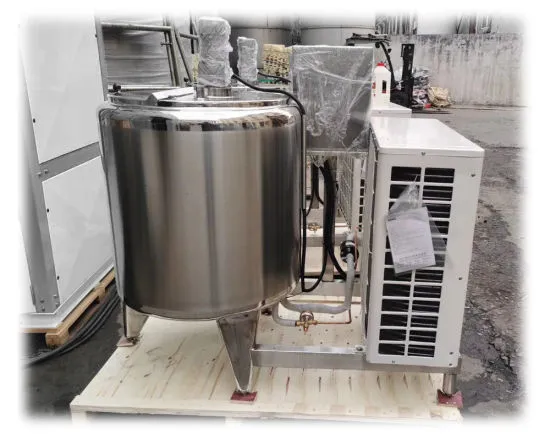- December 18, 2023
- Posted by: VisionPlus Automation
- Category: milk chillers

How Milk Chillers Enhance Quality and Add Value to Milk
How Milk Chillers Enhance Quality and Add Value to Milk
Introduction:
In the dynamic landscape of the dairy industry, innovations such as milk chillers have revolutionized the way milk is handled and preserved. These technological marvels are not just refrigeration units; they are the unsung heroes that enhance the quality of milk, ensuring freshness, safety, and value addition. This essay delves into the significant impact of milk chillers, elucidating how they contribute to elevating the quality of milk and adding intrinsic value to this essential dairy product.
1. Preservation of Freshness:
One of the primary functions of milk chillers is to preserve the freshness of milk. Immediately after milking, the milk’s temperature is reduced to slow down bacterial growth and enzymatic reactions that could lead to spoilage. This preservation of freshness not only extends the shelf life of milk but also ensures that consumers receive a product that retains its natural taste and nutritional properties.
2. Prevention of Bacterial Growth:
Milk chillers play a pivotal role in inhibiting the proliferation of harmful bacteria. The rapid cooling of milk prevents the growth of bacteria that could compromise the quality and safety of the product. By maintaining a consistently low temperature, milk chillers create an environment hostile to bacterial activity, safeguarding the integrity of the milk.
3. Quality Retention of Nutrients:
The temperature control provided by milk chillers aids in the retention of essential nutrients in milk. Proteins, vitamins, and minerals are preserved at optimal levels, ensuring that consumers receive the full nutritional benefits of this wholesome beverage. This quality retention is especially critical for meeting the nutritional needs of diverse consumer demographics.
4. Hygienic Handling:
Milk chillers promote hygienic handling throughout the milk processing and distribution chain. The closed and controlled environment of these chilling units minimizes the risk of contamination, ensuring that the milk reaches consumers in a state of purity. This hygienic handling not only enhances the quality of the milk but also contributes to consumer confidence.
5. Value Addition through Extended Shelf Life:
The extended shelf life achieved through the use of milk chillers adds intrinsic value to the product. Dairy farmers and producers can market their milk with confidence, knowing that the freshness is preserved, and consumers can enjoy a longer window of time to use the product. This extended shelf life benefits both producers and consumers by reducing waste and enhancing the economic viability of the dairy industry.
6. Precision Temperature Control:
Modern milk chillers are equipped with sophisticated temperature control systems. This precision ensures that milk is consistently maintained at the ideal storage temperature, preventing fluctuations that could compromise quality. The ability to regulate temperatures with precision contributes to the overall quality assurance in milk preservation.
7. Compliance with Quality Standards:
The use of milk chillers aligns with and often exceeds industry quality standards. Meeting these standards is not only a regulatory requirement but also a testament to a commitment to excellence. Compliance with quality standards reinforces consumer trust and contributes to the positive perception of the brand.
